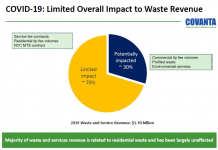Jim Lane
In Washington, an explosive new peer-reviewed report from ICF found that greenhouse gas emission reductions from typical corn-based ethanol production have soared to 43 percent compared to 2005-era gasoline. The report projects that by 2022, corn-based ethanol will achieve a 50 percent reduction, and could reach “76 percent in 2022 if there is more widespread adoption of optimal crop production and biorefinery efficiency.”
The report, issued by the U.S. Department of Agriculture, based its revolutionary emissions math on a November 2014 study by researchers at Iowa State University, which found that farmers around the world have responded to higher crop prices by using available land resources more efficiently, rather than expanding the amount of land brought into production.
Indirect land-use change modeling had suggested for years that higher crop prices would lead to rampant land conversion and result potentially in a massive loss of Amazonian rainforest but the study found that the hard data revealed that farmers acted quite differently. In addition, ethanol production has become more sustainable through modern practices such as generating process heat via natural gas or biogas instead of burning coal, and through higher product yields.
We have the key visual highlights of the report in our Multi-Slide Guide, here.
To view a copy of the USDA analysis, click here.
Reaction from stakeholders
Growth Energy CEO, Emily Skor
“This USDA report clearly demonstrates what we have known for years – that biofuels like ethanol are the most effective alternative to fossil fuel and a critical tool for reducing greenhouse gas emissions and improving air quality. Ethanol is an earth-friendly biofuel produced in America that not only significantly reduces greenhouse gas emissions, but also improves engine performance and saves consumers money at the pump.
“As the report notes, corn ethanol has the potential to reduce greenhouse gas emissions by up to 76 percent when accounting for advancements in production efficiency techniques and sustainable agricultural practices. The ethanol industry works every day to improve production processes, ensuring that ethanol will continue to provide even greater benefits well into the future. The ethanol industry is proud to provide a product that helps clean our air, improves engine performance, and saves consumers money when they fill up their tank.”
Renewable Fuels Association President and CEO Bob Dinneen
“We are pleased that USDA’s analysis reflects the tremendous efficiency gains our industry has made and continues to make. This is not your grandfather’s ethanol industry. Today’s farmers and ethanol producers use less energy than ever before, have lowered costs with new value-added markets and technologies, and evolved into the most cost-effective, cleanest-burning source of octane on the planet. Moreover, as this study proves, concerns about land use change were terribly overblown, and U.S.-produced corn ethanol is a stone-cold winner for the environment, providing dramatic reductions in greenhouse gas emissions.”
“USDA and Secretary Vilsack have done a tremendous service by releasing this study after such a comprehensive and thorough analysis, using real world data and peer-reviewed assumptions. This should answer the critics who have repeated Big Oil’s polemic that renewable biofuels somehow increase carbon emissions.”
Jim Lane is editor and publisher of Biofuels Digest where this article was originally published. Biofuels Digest is the most widely read Biofuels daily read by 14,000+ organizations. Subscribe here.








